January 2024 in “Cosmetics” Menopause worsens skin, hair, and nails, affecting self-esteem and quality of life.

Kerascalp hair serum was found to be safe and effective in improving hair growth and strength in people with mild to moderate hair loss.
[object Object]  1 citations,
July 2023 in “Journal of Clinical Medicine”
1 citations,
July 2023 in “Journal of Clinical Medicine” Different causes of beard hair loss have various treatments, including medications, lifestyle changes, and procedures to stimulate hair growth.
January 2018 in “프로그램북(구 초록집)” Scalpoo® shampoo effectively increases hair thickness and reduces shedding.
October 2011 in “한국생물공학회 학술대회” The shampoo with Scutellaria baicalensis and Glycyrrhiza glabra helps reduce hair loss.
August 2020 in “Prosiding Farmasi” Zinc pyrithione in shampoo effectively treats dandruff.
November 2023 in “Veterinary Science and Medicine Journal” A mixed breed dog's skin condition improved with combined therapy and supportive care.
November 2022 in “Journal of Investigative Dermatology” Targeting inflammation can improve scalp and hair health.
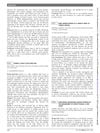
Kerion is a rare but serious scalp infection that needs proper treatment.
1 citations,
May 2022 in “Journal of Drugs in Dermatology” Low-dose naltrexone and platelet-rich plasma can regrow hair in lichen planopilaris.
4 citations,
May 2016 in “PubMed” Green tea hair tonic safely and effectively reduces scalp greasiness.

Cinchona succirubra extract with caffeine reduces hair loss and strengthens hair.
 42 citations,
November 2005 in “The journal of investigative dermatology. Symposium proceedings/The Journal of investigative dermatology symposium proceedings”
42 citations,
November 2005 in “The journal of investigative dermatology. Symposium proceedings/The Journal of investigative dermatology symposium proceedings” New hair products are being developed to keep hair and scalp healthy for everyone.
 February 2024 in “Buletin Veteriner Udayana”
February 2024 in “Buletin Veteriner Udayana” The dog with severe hair loss and itching improved after treatment for ehrlichiosis and demodicosis.
46 citations,
September 2011 in “British journal of dermatology/British journal of dermatology, Supplement” Effective dandruff treatment requires delivering antifungal agents to the scalp follicular infundibulum.
[object Object] 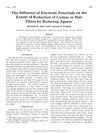 4 citations,
April 1955 in “Textile Research Journal”
4 citations,
April 1955 in “Textile Research Journal” The effectiveness of reducing agents on hair fibers depends on their electrode potentials.
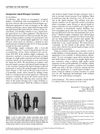 3 citations,
February 2002 in “Dermatologic Surgery”
3 citations,
February 2002 in “Dermatologic Surgery” Using a handheld massage device during hair transplant significantly reduces pain for most patients.
 2 citations,
September 2020 in “Hair transplant forum international”
2 citations,
September 2020 in “Hair transplant forum international” A new tool makes hair transplant surgeries faster by creating multiple cuts in one go.
 February 2023 in “Facial Plastic Surgery Clinics of North America”
February 2023 in “Facial Plastic Surgery Clinics of North America” Careful planning and skilled surgery can make hair replacement safe and effective.
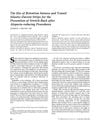 14 citations,
October 1994 in “The Journal of Dermatologic Surgery and Oncology”
14 citations,
October 1994 in “The Journal of Dermatologic Surgery and Oncology” Silastic-Dacron strips effectively prevent stretch-back after hair reduction surgeries.
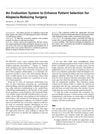 3 citations,
September 2002 in “Dermatologic Surgery”
3 citations,
September 2002 in “Dermatologic Surgery” The evaluation system improved patient selection for hair loss surgery, leading to better results and satisfaction.

Bilateral Orchiectomy effectively reduces the need for anti-androgen medication in most transgender females.
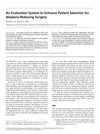 September 2002 in “Dermatologic Surgery”
September 2002 in “Dermatologic Surgery” The evaluation system improves patient selection for hair loss surgery, leading to fewer but more successful surgeries.
 January 1995 in “Surgical technology international”
January 1995 in “Surgical technology international” Using consecutive transposition flaps can manage gaps in hair growth after multiple hair loss surgeries.
September 2014 in “Daehan miyong hakoeji” Adding 2% glycerin or hyaluronic acid to permanent wave treatments reduces hair damage, with hyaluronic acid being more effective.
20 citations,
December 2012 in “Journal of molecular structure” The study found that thioglycolic acid breaks down hair bonds more consistently than l-cysteine, which is less damaging to hair.
 2 citations,
July 2019 in “Journal of psychology & clinical psychiatry”
2 citations,
July 2019 in “Journal of psychology & clinical psychiatry” Zinc helps reduce the severity of depression.
 2 citations,
October 2017
2 citations,
October 2017 Vibration anesthesia can significantly lessen the pain during hair restoration surgery.
 February 2024 in “Molecules/Molecules online/Molecules annual”
February 2024 in “Molecules/Molecules online/Molecules annual” NMN could potentially treat hair loss by reducing oxidative stress and improving cell health.
 January 2024 in “Biochemical and Biophysical Research Communications”
January 2024 in “Biochemical and Biophysical Research Communications” Lack of zinc can cause hearing loss by damaging important parts of inner ear cells in mice.


















